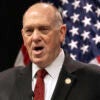The Obama Administration is pushing hard for a reauthorization of No Child Left Behind (NCLB) before the start of the 2011–2012 school year. Education Week reports that on Tuesday, Education Secretary Arne Duncan told an audience that NCLB reauthorization “can’t be done on Washington time. It needs to happen on real people’s time.”
But the push is as foolhardy as it is ambitious.
In a statement Tuesday, Representative John Kline (R–MN), chairman of the House Education and the Workforce Committee, expressed concern about Duncan’s rush to reauthorize the largest federal education law:
Our education system is in critical need of improvement, but we have all seen what can result when Congress hastily crafts sweeping legislation to meet an arbitrary deadline.
Kline is right. Let’s remember what happened last time Congress quickly crafted “sweeping legislation.” We ended up with then-Speaker Nancy Pelosi (D–CA) telling the American people Congress would have to pass the health care bill before we could read the language. We ended up with an unprecedented overreach into the lives of the American people by the federal government. We ended up with Obamacare.
But when it comes to education, conservatives in Congress are pushing back. Kline says he won’t be granting the Obama Administration a reauthorization of the failed NCLB. Instead he’s making a counter-offer to President Obama and Secretary Duncan: Put power back in the hands of state and local leaders. Meanwhile, other conservatives in Congress are providing an opportunity for states to put the 10th Amendment into practice and opt out of the many federal programs under NCLB.
Conservatives in Congress are refusing to go along with reauthorization of NCLB (the ninth reauthorization of the 1965 law that forms the cornerstone of the federal role in education). Instead, they propose the following:
- Elimination of ineffective and duplicative programs. In a bold first step, Representative Duncan Hunter (R–CA), chairman of the Education and the Workforce’s K-12 education subcommittee, has introduced a measure to eliminate 43 out of 80 ineffective and duplicative programs under NCLB. The proposal, which made it out committee on May 25, would eliminate such programs as Even Start Family Literacy Programs; Striving Readers; Smaller Learning Communities; and the Alaska Natives, Native Hawaiians, and Whaling Partners Program in an effort to streamline federal bureaucracy and get Washington out of many of the details of local schools, where it doesn’t belong.
- Flexibility with federal funding. Kline said recently that “schools are enormously frustrated…that they can’t move money [between programs]. They can only spend it where the federal government says.… They need flexibility in funding. And so we are crafting legislation to provide funding flexibility.” Kline’s proposed alternative to NCLB would include allowing cross-program flexibility among many of the programs that are authorized under the law.
- Accountability to parents and taxpayers. Over the past half-century, states have become increasingly accountable to Washington while becoming less accountable to those people who matter most: parents and taxpayers. Part of the problem has been the proliferation of federal programs, which require state and school leaders to complete loads of paperwork to comply with program regulations. These programs and the federal funding stream have made schools and states accountable to the Washington bureaucracy, not parents and taxpayers. NCLB significantly increased this problem, and Kline has indicated that this is something he wants to change. In remarks at Heritage on May 10, Kline said that “fundamentally, we’re asking the question: ‘accountable for what, to whom?’ Maybe you don’t need to be accountable to the Secretary of Education. Maybe you ought to be accountable to the local community, to parents.”
- A-PLUS. The Academic Partnerships Lead Us to Success (A-PLUS) proposal would allow states to opt out of the many federal programs under NCLB and spend their education dollars in ways that best meets student needs. Through the A-PLUS approach, states would have the authority to spend more of their own money on priorities that state and local leaders deem most important for improving educational excellence for students.
These four proposals are complimentary and provide a state-driven, student-centered approach to reforming K-12 education. It represents a long-overdue effort to restore state and local control and empower those closest to the child.
There are some 60 competitive grant programs and approximately 20 formula grant programs that fall under NCLB. In all, the Department of Education operates more than 100 competitive and formula grant programs. The complex application processes of many grant programs waste time and resources that could be better employed in the classroom. And competitions for funding for niche programs give leverage for Washington to take a top-down approach to systemic education reform that reaches into all areas of education.
The A-PLUS proposal immediately allows states to opt out of onerous federal programs that fall under NCLB. At the same time, policymakers should clean up the underlying law to streamline bureaucracy and more effectively distribute resources.
Washington has failed for nearly 50 years to improve academic outcomes. It’s time to hand the reins back to state and local leaders who are accountable to parents and taxpayers—not bureaucrats in Washington.





























8 Replies to “Better Alternatives to No Child Left Behind”